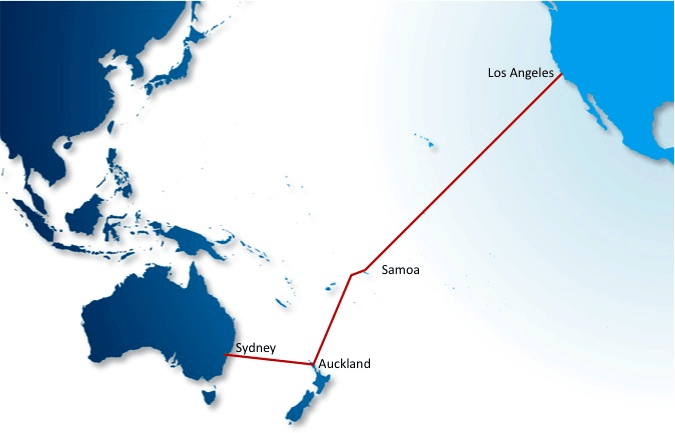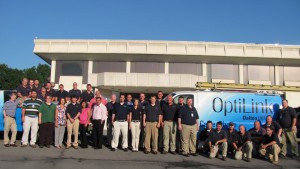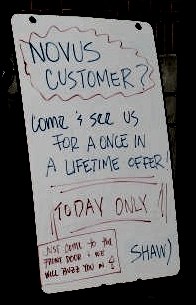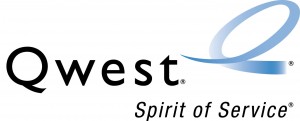Australia and New Zealand remain the two countries most notorious for Internet Overcharging schemes like usage caps and speed throttles. The lack of international broadband capacity is routinely blamed for limiting broadband usage for consumers in both southern Pacific countries, and now a major undersea fiber optic cable project seeks to end those Internet Overcharging schemes once and for all.
Pacific Fibre hates usage caps. The company, which is one of the partners in a planned 5.12 terabits per second undersea cable connecting the United States with New Zealand and Australia, believes limiting broadband consumption is bad for business — theirs and the digital economies of both nations. Now the company is reportedly willing to put its money where its mouth is, charging broadband providers a flat rate per customer for unlimited access to its backbone network.
The company believes such pricing will force providers into selling more generous, often unlimited broadband service packages for businesses and consumers. Providers have routinely blamed insufficient international capacity for restrictive data caps. But increasing capacity, including Pacific Fibre’s new cable set to begin service in 2013, removes that excuse once and for all.
Co-founder Rod Drury believes there will be so much capacity, if providers continue to engage in Internet Overcharging schemes, most of the newly available bandwidth could actually go unsold.
“Why don’t we flip the model around and go to a per-person charging model and then try to give internet providers as much bandwidth as we possibly can for that?,” Drury told BusinessDay. “The charges could be segmented by customer type; you could do it for mobile connections, home connections, schools, hospitals and businesses, and set a reasonable price.”
[flv]http://www.phillipdampier.com/video/CNBC Interview With Pacnet CEO June-July 2010.flv[/flv]
CNBC talked with Pacnet CEO Bill Barney, one of the partners in the Pacific Fibre project, about bandwidth needs in Asia and how new undersea fiber cables will meet the growing demands. (Segment one of the interview was done in June, segment two in July.) (10 minutes)
Telecommunications Users Association chief executive Ernie Newman said Drury’s idea was long overdue. “The way the world is moving is towards all-you-can-eat-type plans and any move like that has got to be the way of the future.”
 But one of Pacific Fibre’s competitors, Southern Cross, which currently provides undersea fiber connections for South Pacific Internet Service Providers, said he wasn’t sure Drury’s idea would work.
But one of Pacific Fibre’s competitors, Southern Cross, which currently provides undersea fiber connections for South Pacific Internet Service Providers, said he wasn’t sure Drury’s idea would work.
Southern Cross marketing director Ross Pfeffer said broadband providers haven’t been justified limiting broadband usage for some time, as newly available capacity has already helped ease the bandwidth crunch. Instead, critics contend existing providers don’t want to give up the massive profits they are earning limiting usage, maximizing revenue from users who think twice before using high bandwidth services, thus reducing required investments in network upgrades.
“New Zealand internet providers [are] using data caps to segment the retail market and maximize their own revenues,” Pfeffer noted.
Both Australia and New Zealand are embarked on National Broadband Plans to take back some control of their broadband futures from private providers many accuse of monopolizing an increasingly important part of both countries’ digital economies.
Drury’s project, and others like it, may become important components of newly constructed national fiber-to-the-home projects proposed in Australia, and dramatically improved service in New Zealand.
[flv width=”480″ height=”292″]http://www.phillipdampier.com/video/Underwater cable laying 1936.flv[/flv]
The history of deploying underseas cables is a fascinating one. Check out this 1936 documentary showing how AT&T made undersea phone cables to connect the San Francisco Bay area. Back then, companies didn’t use rubber or plastic cable jackets to keep the water out. They used jute fiber and paper! Some other companies used gutta percha, which is today best known for root canal fillings, or tar mixtures. (5 minutes)
[flv width=”484″ height=”292″]http://www.phillipdampier.com/video/BBC Cable Under the Sea.flv[/flv]
Before there was telephone service, the challenges of connecting the far flung components of the British Empire were met by underseas telegraph cables beginning in the 1870s. A fascinating BBC documentary visited Porthcurno, located at the tip of Cornwall, England, where 14 undersea telegraph cables stretched from a single beach to points all around the globe. Then something called “wireless” arrived and threatened to ruin everything. (8 minutes)
[flv width=”480″ height=”380″]http://www.phillipdampier.com/video/Fiber Optic Cable.flv[/flv]
But what exactly is “fiber optic cable” and how is it made? More importantly, how do they store thousands of miles of fiber optic cable on a single ship, ready to drop to the bottom of the ocean? The answers to both are here. (12 minutes)


 Subscribe
Subscribe








